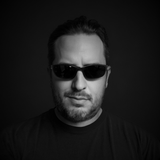The Broken Promise of Synthetic Transcendence

by Aiden Haefer | Banks Media Productions | 01.15.2035
There’s nothing special about the Plummer Tower on the corner of Fountain and Gardner in Hollywood, California. It has a modern design of black windows on a gray grid and stands fifty stories tall. From the outside, you wouldn’t be able to tell it houses one of the biggest lies of the twenty-first century.
Since the technology was developed twenty years ago by Perion Synthetics, more than 78,000 Americans have bought into the slick marketing campaigns of companies like Vitra Synth.
Their message isn’t subtle: by transferring to a synthetic body, you can live forever.
It sounds too good to be true, doesn’t it? Prospective clients are told their consciousnesses are moved to a synthetic body, but how is that even possible? A synthetic body doesn’t have an organic brain. Just because you read out of one book and write to another doesn’t mean it’s the same book.
This is hardly a new question:
In Reasons and Persons, [Derek] Parfit asks the reader to imagine entering a “teletransporter”, a machine that puts you to sleep, then destroys you, breaking you down into atoms, copying the information and relaying it to Mars at the speed of light. On Mars, another machine re-creates you (from local stores of carbon, hydrogen, and so on), each atom in exactly the same relative position. Parfit poses the question of whether or not the teletransporter is a method of travel — is the person on Mars the same person as the person who entered the teletransporter on Earth? Certainly, when waking up on Mars, you would feel like being you, you would remember entering the teletransporter in order to travel to Mars, you would even feel the cut on your upper lip from shaving this morning.
Then the teleporter is upgraded. The teletransporter on Earth is modified to not destroy the person who enters it, but instead it can simply make infinite replicas, all of whom would claim to remember entering the teletransporter on Earth in the first place.
Using thought experiments such as these, Parfit argues that any criteria we attempt to use to determine sameness of person will be lacking, because there is no further fact. What matters, to Parfit, is simply “Relation R”, psychological connectedness, including memory, personality, and so on. [source]
The method of transcendence offered by Vitra Synth is similar to Parfit’s teletransporter idea. A wealthy subject’s brain is copied bit-for-bit into a synthetic chassis. According to VS representatives, the process is “destructive” and leaves the subject’s brain non-viable. Thus, the original human dies while the synthetic human lives on.
But, as Parfit points out, is the new synthetic you really you?
More to the point, by electing to undergo a procedure that renders our brains non-viable, thereby resulting in our own deaths, are we not committing some form of suicide?
For the rich and powerful, the prospect of immortality likely outshines any philosophical questions of self, but for the rest of us, we have to ask ourselves: who are these synthetic humans? Do they share our goals, values, and beliefs?
Is the process of transcendence truly destructive? Or does it simply need to be to prevent Parfit’s paradox (or more likely, uncomfortable questions)? There won’t be any risk of waking up on the wrong table if the original human is killed, right?
It’s not hard to understand why First Humans groups like Tru Organa and Stop Synthetic Proliferation were created. By allowing companies like Vitra Synth to offer Personhood-as-a-Service, we are setting a precedent that devalues human life and raises synthetic life to a level matching our own.
The kicker? None of it would be possible if customers were more informed.
2015 gave us the dawn of synthetic humans. In 2025, Joseph Perion championed a synthetics rights campaign started by his father, resulting in the granting of personhood to fifteen hundred synthetics. Today, there are almost 80,000 synthetic humans walking around as if they are just like us.
They’re not.
If you’re considering synthetic transcendence, consider this:
- Your organic body will die; thus you will die
- A copy (screw what the marketing says) of your consciousness will awake in a synthetic body. You will not be human. You will not be you.




